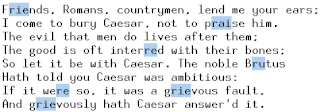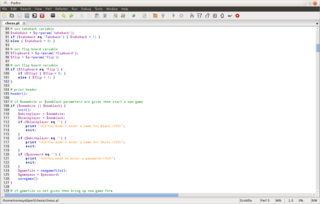Related Research Articles
The Artistic License is an open-source license used for certain free and open-source software packages, most notably the standard implementation of the Perl programming language and most CPAN modules, which are dual-licensed under the Artistic License and the GNU General Public License (GPL).
The Comprehensive Perl Archive Network (CPAN) is a software repository of over 250,000 software modules and accompanying documentation for 39,000 distributions, written in the Perl programming language by over 12,000 contributors. CPAN can denote either the archive network or the Perl program that acts as an interface to the network and as an automated software installer. Most software on CPAN is free and open source software.

Perl is a high-level, general-purpose, interpreted, dynamic programming language. Though Perl is not officially an acronym, there are various backronyms in use, including "Practical Extraction and Reporting Language".

PHP is a general-purpose scripting language geared towards web development. It was originally created by Danish-Canadian programmer Rasmus Lerdorf in 1993 and released in 1995. The PHP reference implementation is now produced by the PHP Group. PHP was originally an abbreviation of Personal Home Page, but it now stands for the recursive acronym PHP: Hypertext Preprocessor.

A regular expression, sometimes referred to as rational expression, is a sequence of characters that specifies a match pattern in text. Usually such patterns are used by string-searching algorithms for "find" or "find and replace" operations on strings, or for input validation. Regular expression techniques are developed in theoretical computer science and formal language theory.

Randal L. Schwartz, also known as merlyn, is an American author, system administrator and programming consultant. He has written several books on the Perl programming language, and plays a promotional role within the Perl community. He was a co-host of FLOSS Weekly.
Parrot is a discontinued register-based process virtual machine designed to run dynamic languages efficiently. It is possible to compile Parrot assembly language and Parrot intermediate representation to Parrot bytecode and execute it. Parrot is free and open-source software.
A backdoor is a typically covert method of bypassing normal authentication or encryption in a computer, product, embedded device, or its embodiment. Backdoors are most often used for securing remote access to a computer, or obtaining access to plaintext in cryptosystems. From there it may be used to gain access to privileged information like passwords, corrupt or delete data on hard drives, or transfer information within autoschediastic networks.

Raku is a member of the Perl family of programming languages. Formerly named Perl 6, it was renamed in October 2019. Raku introduces elements of many modern and historical languages. Compatibility with Perl was not a goal, though a compatibility mode is part of the specification. The design process for Raku began in 2000.
A penetration test, colloquially known as a pentest, is an authorized simulated cyberattack on a computer system, performed to evaluate the security of the system; this is not to be confused with a vulnerability assessment. The test is performed to identify weaknesses, including the potential for unauthorized parties to gain access to the system's features and data, as well as strengths, enabling a full risk assessment to be completed.
Windows Services for UNIX (SFU) is a discontinued software package produced by Microsoft which provided a Unix environment on Windows NT and some of its immediate successor operating-systems.
Pugs is a compiler and interpreter for the Raku programming language, begun on 1 February 2005, by Audrey Tang. Raku was then called Perl 6.

In computer science, the syntax of a computer language is the rules that define the combinations of symbols that are considered to be correctly structured statements or expressions in that language. This applies both to programming languages, where the document represents source code, and to markup languages, where the document represents data.

Allison Randal is a software developer and author. She was the chief architect of the Parrot virtual machine, a member of the board of directors for The Perl Foundation, a director of the Python Software Foundation from 2010 to 2012, and the chairman of the Parrot Foundation. She is also the lead developer of Punie, the port of Perl 1 to Parrot. She is co-author of Perl 6 and Parrot Essentials and the Synopses of Perl 6. She was employed by O'Reilly Media. From August 2010 till February 2012, Randal was the Technical Architect of Ubuntu at Canonical.

Chromatic is a writer and free software programmer best known for his work in the Perl programming language. He lives in Hillsboro, Oregon, United States. He wrote Extreme Programming Pocket Guide and the lead author of Perl Hacks, co-wrote Perl Testing: A Developer's Notebook, and is an uncredited contributor to The Art of Agile Development. He has a music degree. Also, he has contributed to CPAN, Perl 5, Perl 6, and Parrot.

Rakudo is a Raku compiler targeting MoarVM, and the Java Virtual Machine, that implements the Raku specification. It is currently the only major Raku compiler in active development.

Padre is a multi-language software development platform comprising an IDE and a plug-in system to extend it. It is written primarily in Perl and is used to develop applications in this language.
The Perl virtual machine is a stack-based process virtual machine implemented as an opcodes interpreter which runs previously compiled programs written in the Perl language. The opcodes interpreter is a part of the Perl interpreter, which also contains a compiler in one executable file, commonly /usr/bin/perl on various Unix-like systems or perl.exe on Microsoft Windows systems.
The following outline is provided as an overview of and topical guide to the Perl programming language:
References
- ↑ A rose by any other name... (#13961) Archived 2011-06-05 at archive.today , Journal of Allison (3003), Wednesday August 06, 2003